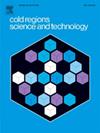Hysteresis of unfrozen water content of tailing mud with freeze-thaw and its correlation with electrical conductivity
IF 3.8
2区 工程技术
Q1 ENGINEERING, CIVIL
引用次数: 0
Abstract
Identifying the correlation between the hysteresis of unfrozen water content and the electrical conductivity (EC) of tailing mud with freeze-thaw is essential for determining the range of frost hazards in tailings ponds by field conductivity measurement and enabling targeted treatment in coastal and seasonally frozen areas. In this study, dynamics of unfrozen water content and temperature of saturated tailing mud samples with 0.0–5.0 % NaCl were evaluated with 5TM sensor while the EC with the frequency domain reflectometry (FDR) sensor. Results show that unfrozen water hysteresis of tailing mud with freeze-thaw occurred below phase-change temperatures, with the cooling section above the warming. The area of hysteresis curve rose upon higher salinity or fewer freeze-thaw cycles. Phase-change temperatures of tailing mud, including freezing and thawing points, depressed with higher salinity but were less affected by freeze-thaw cycles, with the former coinciding with the liquidus line of NaCl solution while the latter located above. The EC curve also exhibits hysteresis with freeze-thaw and the initial salinity determines both the maximum EC value and the slope logEC/T below phase-change temperatures. It was concluded that the unfrozen water content, converted salt concentration and EC of frozen tailing mud show synchronous changes. A modified Michalowski model, with phase-change temperatures and residual unfrozen water content respectively simplified as proportional and exponential functions of initial salinity, was established to characterize the unfrozen water hysteresis of tailing mud with freeze-thaw cycles. A simple EC model with hysteresis was then developed by approximating the EC of frozen tailing mud as a power function of the converted salt concentration, which was applied to the tailing mud with 0.5–5.0 % NaCl in the range of −20 °C up to phase-change temperatures.
尾矿泥浆未冻含水量随冻融作用的滞后及其与电导率的相关性
要想通过现场电导率测量确定尾矿库的冰冻危害范围,并在沿海和季节性冰冻地区进行有针对性的处理,就必须找出尾矿泥未冻结含水量滞后与电导率(EC)冻融之间的相关性。在这项研究中,使用 5TM 传感器评估了含 0.0-5.0 % NaCl 饱和尾矿泥样品的解冻水含量和温度动态,同时使用频域反射仪 (FDR) 传感器评估了导电率。结果表明,尾泥在冻融过程中的未冻水滞后发生在相变温度以下,冷却段高于升温段。盐度越高或冻融周期越短,滞后曲线的面积越大。尾矿泥浆的相变温度(包括冰点和融点)随盐度升高而降低,但受冻融循环的影响较小,前者与氯化钠溶液的液相线重合,而后者则位于其上方。导电率曲线还表现出冻融滞后现象,初始盐度决定了最大导电率值和相变温度以下的斜率 logEC/T。结论是,冻结尾矿泥浆的解冻含水量、转化盐浓度和导电率呈现同步变化。建立了一个改进的 Michalowski 模型,将相变温度和残余未冻结水含量分别简化为初始盐度的比例函数和指数函数,以描述冻融循环尾泥未冻结水滞后的特征。然后,通过将冻结尾泥的导电率近似为转换盐浓度的幂函数,建立了具有滞后性的简单导电率模型,该模型适用于-20 °C至相变温度范围内含0.5-5.0 % NaCl的尾泥。
本文章由计算机程序翻译,如有差异,请以英文原文为准。
求助全文
约1分钟内获得全文
求助全文
来源期刊

Cold Regions Science and Technology
工程技术-地球科学综合
CiteScore
7.40
自引率
12.20%
发文量
209
审稿时长
4.9 months
期刊介绍:
Cold Regions Science and Technology is an international journal dealing with the science and technical problems of cold environments in both the polar regions and more temperate locations. It includes fundamental aspects of cryospheric sciences which have applications for cold regions problems as well as engineering topics which relate to the cryosphere.
Emphasis is given to applied science with broad coverage of the physical and mechanical aspects of ice (including glaciers and sea ice), snow and snow avalanches, ice-water systems, ice-bonded soils and permafrost.
Relevant aspects of Earth science, materials science, offshore and river ice engineering are also of primary interest. These include icing of ships and structures as well as trafficability in cold environments. Technological advances for cold regions in research, development, and engineering practice are relevant to the journal. Theoretical papers must include a detailed discussion of the potential application of the theory to address cold regions problems. The journal serves a wide range of specialists, providing a medium for interdisciplinary communication and a convenient source of reference.
 求助内容:
求助内容: 应助结果提醒方式:
应助结果提醒方式:


